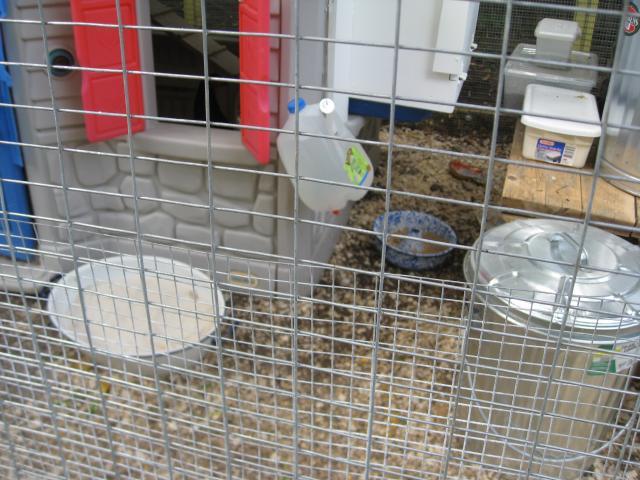I did not use any chicken wire at all. Decided it was way too flimsy to be of any use as protection from predators. For the same reason, I did not use any staples to permanently secure the wire mesh to the wooden frame of my run.
I built a 9 foot by 15 foot wood frame for the run and lined it on all four sides and the top with 14 gauge, galvanized steel, welded wire mesh of one-inch by two-inch openings in the mesh. Fourteen gauge is nice and thick and therefore nice and strong.
The wire is attached to the vertical lumber and the horizontal lumber frame of the run by long screws positioned inside large metal washers. A cordless power drill is a girl's best friend.
Inside the run, from the ground up to three feet high, we added a layer of a 19 gauge welded wire mesh of half-inch by half-inch openings in the mesh. Overlaying the heavier 14 gauge wire mesh. That's to prevent the local raccoons from being able to reach inside the larger holes of the stronger-gauge wire surrounding the run.
The heavy-weight 14 gauge wire extends down into the earth for eight inches, and then flares out for two feet horizontally underground. We covered the buried wire with rocks, earth, plantings and mulch.
Covered two-thirds of the run with clear, corrugated, roof panels from Home Depot. Tilted, to allow rain to run off.
With the run entirely predator proof, we placed the coop smack dab in the center of the run. Freestanding. Not attached to the run. We leave the coop door open all day and all night. No need to be involved with opening the coop in the morning or shutting it up at night. So easy on us. We can sleep late; we don't have to go out in the rain. I check on them and bring them treats every day, but I do it whenever I feel like it.
When shopping for wire mesh fencing for your chickens, you're interested in the strength of the wire, what material the wire is made of, the size of the holes in the mesh, how long the rolled up bolt of mesh will be when you unroll it, and how wide the bolt is.
Steel is strong, but rusts outdoors in the rain and snow, so it's given a coat of zinc to make it rustproof. After the manufacturer coats it with zinc, it's called galvanized steel.
The wire is available in a variety of different thicknesses. Thin, if you don't need much strength; thicker if you want to keep out the raccoons. The gauge number of the wire refers to the thickness of the individual strand of wire. In other words, strands of 14 gauge wire are thicker than 19 gauge.
DH and I wore gloves, and managed to do it all without too many scratches. We took turns spelling each other at the drill and either of us could have done it all alone. Just went quicker with the two of us. We did use a staple gun a few times just to temporarily hold the mesh in place until we got the first screw and washer drilled into position.









